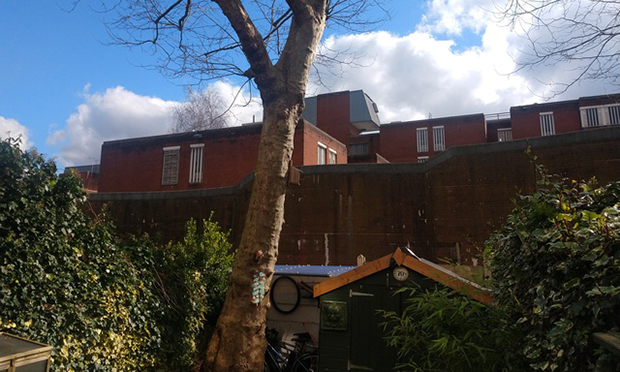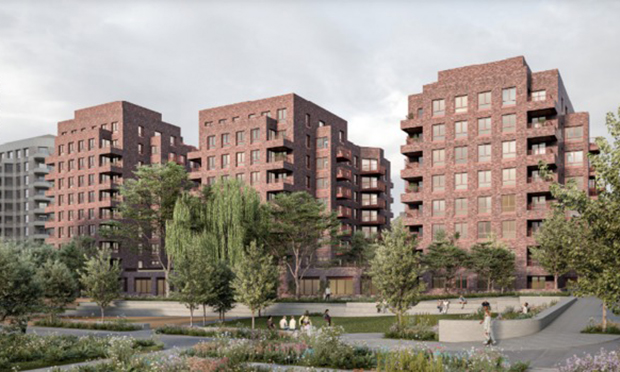Controversial plans for former Holloway prison approved in face of complaints from locals

View of the former prison from a neighbouring garden. Photograph: local resident
The former site of Europe’s largest women’s prison, where Ruth Ellis was the last woman to be hanged in Britain, will be transformed into 985 homes despite neighbours’ concerns.
The last cell door clanged shut at Holloway women’s prison in 2016 and the 10-acre site off Parkhurst Road was sold to housing association Peabody for £81.5m three years later.
The £400m scheme includes 15 towers up to 14 storeys high. Six of the towers breach the council’s policy that tall buildings above 30 metres are generally inappropriate.
The plan was approved on International Women’s Day after four hours of discussion, with the council’s planning committee deciding that the benefit of 415 new social homes outweighed any harm.
The homes will “radically change things in the borough”, said Cllr Flora Williamson, who was still concerned about the impact of the taller buildings.
Cllr Jenny Kay said: “We really recognise how much harm this development will do to some of the neighbouring estates.”
Helen Strongman from the nearby Bakersfield estate, once home to prison staff, told the planning committee : “Existing residents feel their rights are not treated equally to the prospective residents.”
She said people in neighbouring Penderyn Way and Trecastle Close are concerned that “hundreds of local residents will see a reduction in daylight and sunlight”.
Peabody’s plans include five blocks of homes – 60 per cent affordable – including some for people needing extra care, a park and commercial units.
Islington Council’s planning committee deferred a decision last month over concerns about mixed tenure on the busy and polluted Parkhurst and Camden Road, facilities for young people and the affordability of homes.
Councillors at yesterday’s meeting pushed Peabody to agree to hold a mid-term review and change shared ownership homes into more affordable London Living Rent properties if the surplus was sufficent.
It emerged there is a predicted surplus of £56m on the development which will cost Peabody £400m – three quarters on construction costs.
Councillor Paul Convery said: “You are clearly going to create a surplus. We really want to see that surplus spent here.”

Artist’s impression of a new park at the site
At February’s meeting, councillors asked Peabody to go back to the drawing board and deal with their concerns.
Project director Tom Wilkinson said the team made changes and the scheme is a “high quality design, landscape-led, tenure-blind development”.
He said it was “a once-in-a-lifetime opportunity to deliver services for Islington”.
Changes saw market homes moved to the main road and over-12s given access to a range of facilities such as a gym and table tennis space.
Debbie Humphry from Islington Homes For All said she was concerned that the levels of homes for market sale and social rent are “disproportionate”.
Another sticking point was the funding of a women’s building to support women who have been in trouble with the law, and to reflect the site’s history.
Ruth Ellis was hanged at the prison in 1955 – the last woman to be executed in the UK.
Other famous prisoners included child killer Rose West and the Suffragettes, including leader Emmeline Pankhurst, who staged hunger strikes and were force-fed there.
Mandy Ogunmokun from Treasures Foundation said it was crucial to provide effective services at the women’s building.
She said: “If you change one woman, you change a whole generation.”
Niki Gibbs from Reclaim Holloway criticised the building’s design: “If you want an exceptional visual example of the continued suppression and discrimination of women, this is it – on a legacy site for women.”
She said: “This site needs to be a community with an iconic women’s building.”
Wilkinson said the women’s building is “important” and will be in the most prominent part of the site.
Peabody aims to get the first spade in the ground this year, with the first homes finished by 2026.
